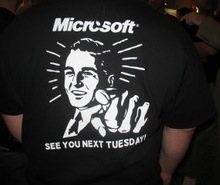'Critical' Windows Media flaws put millions at risk


The company is urging Windows users to pay special attention to MS12-004, a "critical" bulletin that provides fixes for two serious flaws in the way Windows Media handles certain media files.
The first issue can be exploited if a hacker used a specially crafted MIDI file, Microsoft warned. The successful attacker could gain remote code execution against a target running the ubiquitous Windows Media Player.
The second critical vulnerability is caused when when filters in DirectShow do not properly handle specially crafted media files. DirectShow is a part of Microsoft DirectX, a Windows feature used for streaming media on Windows operating systems to enable graphics and sound when playing games or watching video.
Microsoft expects to see reliable exploit code against these vulnerabilities within 30 days so it's important that Windows users treat MS12-004 with the utmost priority.
Here's a quick look at the other issues in this January patch batch:
- MS12-001: Vulnerability in Windows Kernel Could Allow Security Feature Bypass
This security update resolves a privately reported vulnerability in Microsoft Windows. The vulnerability could allow an attacker to bypass the SafeSEH security feature in a software application. An attacker could then use other vulnerabilities to leverage the structured exception handler to run arbitrary code. Only software applications that were compiled using Microsoft Visual C++ .NET 2003 can be used to exploit this vulnerability.
- MS12-002: Vulnerability in Windows Object Packager Could Allow Remote Code Execution
This security update resolves a privately reported vulnerability in Microsoft Windows. The vulnerability could allow remote code execution if a user opens a legitimate file with an embedded packaged object that is located in the same network directory as a specially crafted executable file. An attacker who successfully exploited this vulnerability could gain the same user rights as the logged-on user.
- MS12-003: Vulnerability in Windows Client/Server Run-time Subsystem Could Allow Elevation of Privilege
This security update resolves one privately reported vulnerability in Microsoft Windows. This security update is rated Important for all supported editions of Windows XP, Windows Server 2003, Windows Vista, and Windows Server 2008. All supported editions of Windows 7 and Windows Server 2008 R2 are not affected by this vulnerability. This could allow elevation of privilege if an attacker logs on to an affected system and runs a specially crafted application.
- MS12-005: Vulnerability in Microsoft Windows Could Allow Remote Code Execution
This security update resolves a privately reported vulnerability in Microsoft Windows. The vulnerability could allow remote code execution if a user opens a specially crafted Microsoft Office file containing a malicious embedded ClickOnce application. An attacker who successfully exploited this vulnerability could gain the same user rights as the local user.
- MS12-006 Vulnerability in SSL/TLS Could Allow Information Disclosure
This security update resolves a publicly disclosed vulnerability in SSL 3.0 and TLS 1.0. This vulnerability affects the protocol itself and is not specific to the Windows operating system. The vulnerability could allow information disclosure if an attacker intercepts encrypted web traffic served from an affected system. TLS 1.1, TLS 1.2, and all cipher suites that do not use CBC mode are not affected.
- MS12-007: Vulnerability in AntiXSS Library Could Allow Information Disclosure
This security update resolves one privately reported vulnerability in the Microsoft Anti-Cross Site Scripting (AntiXSS) Library. The vulnerability could allow information disclosure if a an attacker passes a malicious script to a website using the sanitization function of the AntiXSS Library. The consequences of the disclosure of that information depend on the nature of the information itself. Note that this vulnerability would not allow an attacker to execute code or to elevate the attacker's user rights directly, but it could be used to produce information that could be used to try to further compromise the affected system. Only sites that use the sanitization module of the AntiXSS Library are affected by this vulnerability.